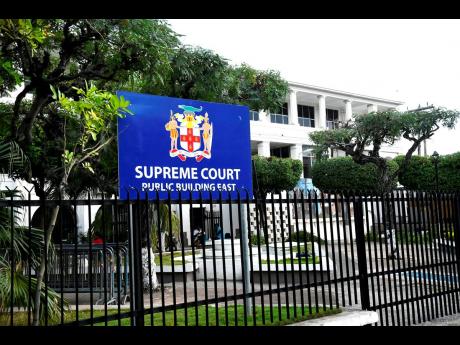‘Finsac-ed’ businessman refused permission to appeal property sale
The Court of Appeal has refused to grant permission to businessman Winston Finzi to challenge a lower court’s judgment in favour of the Jamaica Redevelopment Foundation (JRF) which sold his property in St James after he defaulted on a settlement agreement.
The JRF acquired the largest portfolio of distressed debt held by the Financial Sector Adjustment Company, Finsac and sold by the Jamaican Government as part of the reconstruction of the financial sector two decades ago.
Finzi had sought permission to appeal the decision of Justice Kissock Laing made on July 28, 2017. By that decision, Justice Laing granted summary judgement against Finzi and in favour of the respondents, the JRF, Jason Rudd, Naudia Sinclair, Allan Wood, and the law firm Livingston, Alexander and Levy.
Finzi had also sought a stay of execution of the orders made, including costs awarded against him, until the disposal of the appeal.
According to the Court of Appeal judgement delivered by Justice Frank Williams recently, in the claim filed in the Supreme Court on February 23, 2017, Finzi sought several orders and declarations against the respondents.
The cause of action was stated to be based on a claim “for fraud and conspiracy to defraud arising out of the purported collection of debt alleged by them to have been transferred to the first defendant (JRF) from Finsac and from the illegal sale of lands … under the disguise that they were for legitimate debts owed”.
The Court of Appeal also noted by way of further background that Finzi and the JRF, on August 28, 2012, entered into a settlement agreement by which the then-outstanding matters between them were settled.
The agreement was made with respect to property that is part of Providence Estate in St James. Livingston, Alexander and Levy, on behalf of the JRF, then had possession of the duplicate certificate of title for that property.
Justice Williams further noted that the Providence property was sold by the JRF in its capacity as mortgagee to RIU Jamaica Hotel Limited for US$7 million with the consent of Finzi after he had defaulted on his obligations under the settlement agreement. The surplus from the sale price was paid over to him, but that amount has not been ascertained.
On August 11, 2017, Finzi filed an application for leave to appeal, seeking orders that Justice Laing’s judgement be set aside and that the matter be remitted to the Supreme Court for a case management conference before another judge.
The Court of Appeal, in providing background with respect to the circumstances in which Finzi became aware of information leading to the discovery of what he contends to be fraud perpetrated against him, noted that on August 9, 2011, Finzi received, pursuant to a request made under the Access to Information Act, from Finsac, information that he had requested on July 8, 2011.
He had requested the information in the course of an audit of the loan accounts of two of his companies concerning debts for which the JRF had sued him.
On August 28, 2012, more than a year after receiving the information, he entered into the settlement agreement.
Justice Williams said that Finzi, having been in breach of the terms of the settlement agreement, the JRF sued him and obtained judgment by default, pursuant to which the Providence property was sold in 2015.
Justice Williams also pointed out that Finzi’s claim alleging fraud was not filed until February 23, 2017.
The Court of Appeal found that Finzi has not made out any of the grounds of his application for permission to appeal, with the result that it must be refused.
Attorney Gina Chang, one of Finzi’s lawyers, said she was unable to say what their next move would be.

